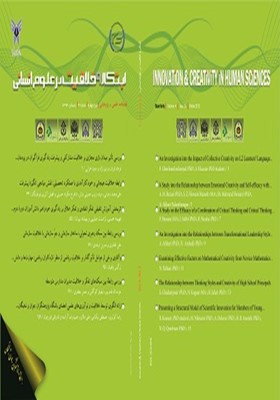A Study into the Relationship between Emotional Creativity and Self-efficacy with Academic Performance: Mediating Role of Achievement Motivation
Subject Areas : Creativity and innovation from psychological, epistemological, educational and pedagogicalAli Mohammad Rezaei 1 , Seyedeh Zeynab Hossani Manesh 2 , Shahrokh Makvand Hossani 3 , Afzal Akbari Balootbangan 4
1 - استادیار، گروه روانشناسی تربیتی دانشگاه سمنان، سمنان، ایران (نویسنده مسئول) rezaei_am@semnan.ac.ir
2 - کارشناسی ارشد روانشناسی تربیتی دانشگاه سمنان، سمنان، ایران z.hossinimanesh@yahoo.com
3 - دانشیار، گروه روانشناسی بالینی دانشگاه سمنان، سمنان، ایران shmakvand@yahoo.com
4 - دانشجوی کارشناسی ارشد روانشناسی تربیتی دانشگاه سمنان، سمنان، ایران akbariafzal@ymail.com
Keywords: achievement motivation, Emotional Creativity, Academic Performance, self-efficiency,
Abstract :
Abstract Background: Creativity is one of the most important factors that are related to academic performance. Creativity means unifying all efforts of a human. Aim: The aim of present research was to show the mediating role of achievement motivation in the relationship between emotional creativity, self-efficiency and academic performance of high school female students. Method: A sample comprising of some 350 high school students (age 16-19) were selected using a multistage cluster sampling method. Instruments were included Emotional Creativity Inventory (ECI), Sheerer Self efficacy Inventory, as well as, Hermens Achievement Motivation Questionnaire. The data were analyzed by Path Analysis and Pierson correlation. Results: Results showed positive and significant relation between achievement motivation and academic performance. Positive relation was also evident between self-efficiency and intermediation of achievement motivation and academic performance directly and indirectly. In addition, there is positive relation between emotional creativity and achievement motivation; but its direct and indirect effect on academic performance was not significant. Conclusions: Overall, these results suggested 43% variance of motivation is represented by variations of self-efficiency and emotional creativity and 10% variation of academic performance has been represented by variations of self-efficiency and achievement motivation.


